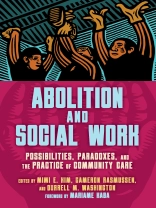A critical anthology exploring the debates, conundrums, and promising practices around abolition and social work in academia and within impacted communities.
Within social work—a profession that has been intimately tied to and often complicit in the building and sustaining of the carceral state—abolitionist thinking, movement-building, and radical praxis are shifting the field. Critical scholarship and organizing have helped to name and examine the realities of carceral social work as a form of “soft policing.” For radical social work, abolition moves beyond critique to the politics of possibility.
Featuring a foreword by Mariame Kaba, Abolition and Social Work offers an orientation to abolitionist theory for social workers and explores the tensions and paradoxes in realizing abolitionist practice in social work—a necessary intervention in contemporary discourse regarding carceral social work, and a compass for recentering this work through the lens of abolition, transformative justice, and collective care.
Table des matières
Foreword
Introduction (Mimi E. Kim, Cameron Rasmussen, and Durrell M. Washington)
Society for Social Work and Research Keynote (Angela Y. Davis)
Section 1: Possibilities
- Abolitionist Social Work (Network to Advance Abolitionist Social Work)
- Abolition: The Missing Link in Historical Efforts to Address Racism and Colonialism Within the Profession of Social Work (Justin Harty, Autumn Asher Black Deer, and Maria Gandarilla Ocampo)
- Reaching for the Abolitionist Horizon Within White Professionalized Social-Change Work (Sophia Sarantakos)
- Abolitionist Reform for Social Workers (Sam Harrell)
Section 2: Paradox
- Is Social Work Obsolete? (Kassandra Frederique)
- No Restorative Justice Utopia: Abolition and Working with the State (Wakumi Douglas)
- Abolition, Social Welfare and the State (Mimi E. Kim, Cameron Rasmussen, and Durrell M. Washington)
Section 3: Praxis
- Staying in love with each other’s survival: Practicing at the Intersection of Liberatory Harm Reduction and Transformative Justice (Shira Hassan)
- Social Work and Family Policing (Joyce Mc Millan and Dorothy Roberts)
- Indigenist Abolition: Strategies for Decolonization, Healing, and Imagination in Social Work Practice (Ramona Beltran, Katie Schultz, Angela Fernandez)
- Involuntary Commitment in Public Sector Mental Health Services: Anti-Carceral Strategies & Responses (Leah Jacobs and Nev Jones)
- Queer Black Feminism and Social Work Practice (Interview with Charlene Carruthers)
A propos de l’auteur
Mariame Kaba is an organizer, educator, librarian, and prison industrial complex (PIC) abolitionist who is active in movements for racial, gender, and transformative justice. Kaba is the founder and director of Project NIA, a grassroots abolitionist organization with a vision to end youth incarceration. Mariame co-leads the initiative Interrupting Criminalization, a project she co-founded with Andrea Ritchie in 2018.Kaba is the author of the New York Times Bestseller We Do This Til We Free Us: Abolitionist Organizing and Transforming Justice (Haymarket Press 2021), Missing Daddy (Haymarket 2019), Fumbling Towards Repair: A Workbook for Community Accountability Faciltators with Shira Hassan (Project NIA, 2019), See You Soon (Haymarket, March 2022) and No More Police: A Case for Abolition with Andrea Ritchie (The New Press, Aug 2022).












